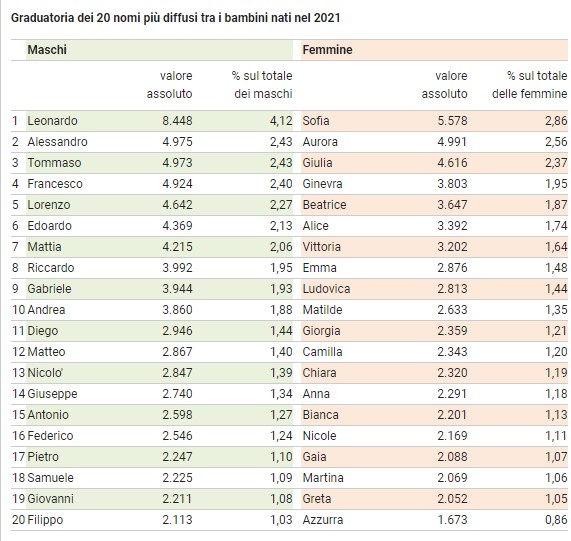REVEALED: These are Italy's most popular baby names

The latest list of Italy's most popular baby names has been published - and as with so many things in this country, there are regional differences.
Sofia and Leonardo remained the most popular names given to new babies in Italy last year, according to Italian statistics agency Istat.
Istat on Monday released the latest list of names most frequently given to newborns in the country as part of its annual report on births, based on data from 2021.
Sofia has been the most popular girls’ name in Italy since 2010, Istat said. In 2021, a total of 5,578 babies were given the name, or just under three percent of baby girls.
Aurora was the second most popular choice, up from third place last year, followed by Giulia and Ginevra.
For boys, Leonardo has also been top of the list since 2018, and was the favourite by a long way in 2021, when the name was given to a total of 8,448 baby boys, or some four percent of boys born in the country.
The second most popular choice for boys was Alessandro, followed by Tommaso and Francesco, all of which were given to just under 5,000 babies each.
READ ALSO: Will my children get an Italian passport if born in Italy?
Classic boys’ names tend to dominate such lists in Italy, where many families traditionally name baby boys after their paternal grandfather or another male relative.
Girls are also often named after their paternal grandmothers, but as the list of most popular names shows, more modern or international-sounding girls’ names have also become popular.
Here are the top ten Italian babies' names:
Boys:
1 Leonardo
2 Alessandro
3 Tommaso
4 Francesco
5 Lorenzo
6 Edoardo
7 Mattia
8 Riccardo
9 Gabriele
10 Andrea
Girls:
1 Sofia
2 Aurora
3 Giulia
4 Ginevra
5 Beatrice
6 Alice
7 Vittoria
8 Emma
9 Ludovica
10 Matilde
Altogether, Istat has recorded more than 26,000 different names for boys and 25,000 for girls since 1999, including composite names (such as Mariagrazia or Gianluca).
But the top 30 this year accounted for some 44 percent of all names given to boys and almost 38 percent for girls.
The data also revealed a north-south divide in name choices. Sofia was the most popular girls' name in all the northern and central-northern regions, while parents in most of the south and centre went for Giulia or Aurora instead.
For boys, Leonardo was by far the favourite choice across all regions in the north and centre except for the autonomous province of Bolzano, where Noah took the top spot.
The southern regions of Puglia and Calabria preferred Francesco, while Antonio was the most popular in Campania and Basilicata, despite not being in the top ten overall.
 The 20 most popular boys' and girls' names in Italy in 2021. Source: Istat
The 20 most popular boys' and girls' names in Italy in 2021. Source: Istat
Among non-Italian parents living in Italy, the most popular names differed, although included many typically Italian names such as Leonardo, Matteo, Luca, and Alessandro, according to data which looked at the country's four biggest international populations.
Leonardo and Sofia were especially popular with Romanian-born parents, as well as David, Gabriel, Sofia Maria, Eva Maria, Noemi or Melissa.
Albanian parents were more likely to choose names like Aron, Liam, Enea, or Noel for boys, or Emily, Aurora, Ambra, Chloe and Emma for girls.
READ ALSO: How much does it cost to raise a child in Italy?
The majority of Moroccan boys meanwhile were named Adam, Amir, Rayan, Youssef and Jad, while the top girls' names were Amira, Jannat, Nour, Sara and Lina.
Parents from Bangladesh favoured Abdullah, Anas, Arham and Ayan for boys, and Fatima, Sara, Ayesha, Maryam and Raisa for girls.
See the full list of baby names on the Istat website, which allows you to search the database to find out how many babies in Italy were given any name each year since 1999.
Comments
See Also
Sofia and Leonardo remained the most popular names given to new babies in Italy last year, according to Italian statistics agency Istat.
Istat on Monday released the latest list of names most frequently given to newborns in the country as part of its annual report on births, based on data from 2021.
Sofia has been the most popular girls’ name in Italy since 2010, Istat said. In 2021, a total of 5,578 babies were given the name, or just under three percent of baby girls.
Aurora was the second most popular choice, up from third place last year, followed by Giulia and Ginevra.
For boys, Leonardo has also been top of the list since 2018, and was the favourite by a long way in 2021, when the name was given to a total of 8,448 baby boys, or some four percent of boys born in the country.
The second most popular choice for boys was Alessandro, followed by Tommaso and Francesco, all of which were given to just under 5,000 babies each.
READ ALSO: Will my children get an Italian passport if born in Italy?
Classic boys’ names tend to dominate such lists in Italy, where many families traditionally name baby boys after their paternal grandfather or another male relative.
Girls are also often named after their paternal grandmothers, but as the list of most popular names shows, more modern or international-sounding girls’ names have also become popular.
Here are the top ten Italian babies' names:
Boys:
1 Leonardo
2 Alessandro
3 Tommaso
4 Francesco
5 Lorenzo
6 Edoardo
7 Mattia
8 Riccardo
9 Gabriele
10 Andrea
Girls:
1 Sofia
2 Aurora
3 Giulia
4 Ginevra
5 Beatrice
6 Alice
7 Vittoria
8 Emma
9 Ludovica
10 Matilde
Altogether, Istat has recorded more than 26,000 different names for boys and 25,000 for girls since 1999, including composite names (such as Mariagrazia or Gianluca).
But the top 30 this year accounted for some 44 percent of all names given to boys and almost 38 percent for girls.
The data also revealed a north-south divide in name choices. Sofia was the most popular girls' name in all the northern and central-northern regions, while parents in most of the south and centre went for Giulia or Aurora instead.
For boys, Leonardo was by far the favourite choice across all regions in the north and centre except for the autonomous province of Bolzano, where Noah took the top spot.
The southern regions of Puglia and Calabria preferred Francesco, while Antonio was the most popular in Campania and Basilicata, despite not being in the top ten overall.

Among non-Italian parents living in Italy, the most popular names differed, although included many typically Italian names such as Leonardo, Matteo, Luca, and Alessandro, according to data which looked at the country's four biggest international populations.
Leonardo and Sofia were especially popular with Romanian-born parents, as well as David, Gabriel, Sofia Maria, Eva Maria, Noemi or Melissa.
Albanian parents were more likely to choose names like Aron, Liam, Enea, or Noel for boys, or Emily, Aurora, Ambra, Chloe and Emma for girls.
READ ALSO: How much does it cost to raise a child in Italy?
The majority of Moroccan boys meanwhile were named Adam, Amir, Rayan, Youssef and Jad, while the top girls' names were Amira, Jannat, Nour, Sara and Lina.
Parents from Bangladesh favoured Abdullah, Anas, Arham and Ayan for boys, and Fatima, Sara, Ayesha, Maryam and Raisa for girls.
See the full list of baby names on the Istat website, which allows you to search the database to find out how many babies in Italy were given any name each year since 1999.
Join the conversation in our comments section below. Share your own views and experience and if you have a question or suggestion for our journalists then email us at [email protected].
Please keep comments civil, constructive and on topic – and make sure to read our terms of use before getting involved.
Please log in here to leave a comment.